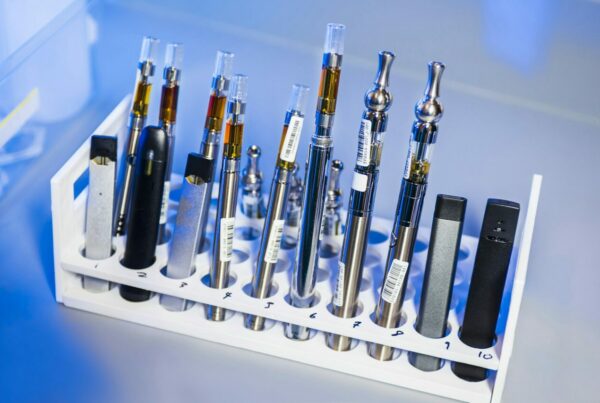N, N-Dimethyltryptamine (DMT) is a compound often discovered in various plants and animals, known for its brief yet potent psychedelic effects upon ingestion.
Emerging evidence implies that DMT, which naturally exists in our bodies, plays crucial roles in both the central and peripheral nervous systems, potentially acting as a neurotransmitter.
DMT is capable of triggering strong psychedelic reactions, but typically it does not cause many negative effects. However, potential cardiovascular complications may arise when large doses are injected.
Let’s explore DMT and its various roles. These roles range from recreational use to its promising possibilities in scientific research and therapeutic contexts.

A Brief Introduction to DMT: What is it?
| Aspect | Details |
| Name | N, N-Dimethyltryptamine (DMT) |
| Classification | Indole alkaloid |
| Occurrence | Found naturally in various plants and animals |
| Psychoactive Effects | Brief, yet potent psychedelic experiences upon consumption. |
| Method of Consumption | Can be smoked, injected, or ingested orally. |
| Duration of Effects | Short-lived, usually lasting between 5 to 30 minutes. |
| Chemical Structure | Comprises a tryptamine core with two methyl groups attached to the amine nitrogen atom. |
| Metabolism | Rapidly metabolized by the body, broken down by monoamine oxidase (MAO). |
| Cultural Use | Historically used in various shamanic and ceremonial rituals by indigenous cultures. |
| Other names | Dimitri, Fantasia, Businessman’s trip, Businessman’s special, 45-minute psychosis, Spiritual molecule |
The Role of DMT in Mental Health
N, N-Dimethyltryptamine (DMT), a compound noted for its potent psychedelic effects, is garnering attention for its potential benefits to mental health. Despite its conventional association with intense visual experiences, recent research suggests a connection between DMT and mental wellness.
Effects on Psychological and Emotional Well-being
DMT is renowned for its psychedelic effects, which can provoke intense emotional reactions and transform one’s state of consciousness. This has the potential to pave the way for innovative therapeutic methods for addressing mental health issues, facilitating emotional processing, and providing new perspectives on personal traumas.
Neuroplasticity and Brain Function
Research suggests that DMT might influence neuroplasticity, thereby helping the brain adapt and reorganize itself. Investigating its impact on synaptic plasticity and neural connectivity could propose potential treatments for conditions associated with neural maladaptation.
Potential Therapeutic Use for Mental Health Disorders
Emerging research points to DMT’s potential in treating disorders such as depression, addiction, and PTSD. Its ability to induce mystical or spiritual experiences could provide a novel approach to psychotherapy, aiding in the reformation of negative thought patterns.
The exploration of DMT’s natural presence in the human body underscores its significance in mental health resilience, stress response, and overall psychological well-being. Understanding how the body controls internal DMT levels might open up avenues for new therapeutic strategies.
DMT and Mental Health Disorders
| Mental Health Disorder | Description | Effectiveness of DMT | Advantages |
| Depression | A mood disorder characterized by persistent sadness, lack of interest, and low motivation | Preliminary studies suggest DMT might alleviate symptoms by inducing profound emotional experiences. | Its rapid onset and ability to trigger transformative experiences could offer novel therapeutic approaches for restructuring negative thoughts and enhancing emotional processing |
| Post-Traumatic Stress Disorder (PTSD) | A mental health disorder triggered by traumatic events leading to flashbacks, intense anxiety, and intrusive thoughts | Initial research indicates the potential of DMT to manage symptoms by inducing spiritual or mystical experiences that could help patients reinterpret traumatic memories | The ability of DMT to induce altered states of consciousness may assist in emotional processing and provide a fresh perspective on traumatic experiences |
| Addiction | A complex disorder marked by compulsive engagement in rewarding stimuli despite negative consequences | Some research suggests that DMT might play a role in breaking addictive patterns and reducing cravings for substances | DMT’s capacity to induce intense and transformative experiences could aid individuals in modifying their behavioural patterns and confronting underlying reasons for their addiction |
Approach to Utilizing DMT
DMT, renowned for triggering short yet profound psychedelic experiences, can be administered in a variety of ways. The chosen method often hinges upon the desired intensity and length of the trip.
Smoking:
When DMT is smoked in a pipe or vaporized, it’s crucial to manage the temperature to avoid overheating and burning the substance. The psychedelic effects kick in almost instantly when DMT is smoked and typically last between 5 to 15 minutes.
Oral Intake:
Taking DMT orally leads to slower onset effects but they last considerably longer, often for several hours, due to the slower breakdown of DMT in combination with an MAOI.
Injection:
DMT can be directly injected into the bloodstream for quick and intense effects.
This approach results in an immediate and powerful experience, however, it requires precise dosage and carries greater risks.
Insufflation (Snorting):
Snorting DMT results in a slower onset of effects compared to smoking, but potentially offers a more prolonged experience.
Sublingual or Buccal Administration:
When absorbed through the oral mucosa, this method presents an alternative to smoking and delivers a longer, though less intense, experience.
Determining Therapeutic Dosage: N, N-Dimethyltryptamine (DMT)
For smoking, the advised dosage ranges from 20 to 40 mg, while for intravenous administration, the suggested dosage is 0.2 to 0.4 mg per kg of body weight. These dosage guidelines are primarily applicable to clinical research, particularly for intravenous use.
- Higher doses given intravenously are associated with intense visuals, temporary loss of control, and a combined state of anxiety and euphoria
- Intriguingly, lower doses have demonstrated less appealing effects
- Recreational doses of smoked DMT typically range from 40 to 50 mg, occasionally even going up to 100 mg
- Various doses of intravenous People who have had near-death experiences associated with DMT (7, 14, 18, and 20 mg solutions) often report lasting positive enhancements in their psychological well-being.
Accessibility of DMT
ProductsOsmosis – 4-ACO-DMT Ethereal Essence Tincture
This tincture is promoted as containing 4-Acetoxy-N, N-dimethyltryptamine (4-AcO-DMT), a DMT variant. As a liquid extract designed for oral use, this particular product may offer a distinctive experience compared to traditional DMT.
Lucid Supply Co. – 5-MeO DMT Vaporizer
This product is a vaporizer supplying 5-Methoxy-N, N-dimethyltryptamine (5-MeO-DMT). It is known for delivering potent, transformative, and often short-lived experiences, with 5-MeO-DMT being the active component.
Integral Alchemist – Acacia – 1ml DMT Vape Cartridge
The Integral Alchemist’s DMT vape cartridge is pre-loaded with N, N-Dimethyltryptamine, presumably designed for those who prefer a discreet and convenient way to consume DMT.
Deadhead Chemist – 5-Meo-DMT Cartridge
This cartridge houses 5-Methoxy-N, N-dimethyltryptamine (5-MeO-DMT), a compound known for its deep and potent effects.
Its potential mental health benefits could be linked to personal growth, spiritual experiences, or therapeutic applications aimed at improving emotional well-being.
Deadhead Chemist – N, N DMT Cartridge
Another offering from Deadhead Chemist, this cartridge contains the traditional N, N-Dimethyltryptamine. Cartridges provide a user-friendly way to ingest DMT, offering a more consistent and controlled experience.
Concluding Remarks
The utilization of N, N-Dimethyltryptamine (DMT) in
How can individuals, interested in DMT, access reliable sources and products?
For those looking to responsibly explore DMT products, reliable platforms like the Magic Mushroom Dispensary Canada Online Dispensary can offer guidance and a variety of options.
Frequently Asked Questions:
How do different DMT products impact mental health differently?
For instance, vaporizers might generate effects swiftly, while tinctures or vape cartridges could provide more controllable and uniform doses.
Adding derivative compounds or 5-MeO-DMT can result in varying intensities and different types of mental health effects.
These slight differences underline the importance of selecting a DMT product based on individual preferences and mental health goals.
Can DMT induce long-term alterations in mental health and personal development?
There is anecdotal evidence that suggests that DMT-induced experiences could have enduring effects on mental health and personal growth.
Profound or transformative experiences, such as those similar to near-death experiences, are frequently associated with ongoing positive changes in mental health and personal development.
Despite being intense and temporary, these experiences often lead to introspection, spiritual revelations, and a sense of unity or enlightenment.
Individuals often report a refreshed perspective on life, increased emotional resilience, and a heightened appreciation for life following these experiences.
What is the most effective method to use DMT for mental health purposes?
It is essential to make informed decisions, which includes thorough research and comprehension of the compound’s effects.
Advice from mental health professionals or seasoned users can provide valuable understanding into possible risks and advantages.
Comprehending personal tolerance and mental preparedness is also key, as is creating a supportive and secure environment for the experience.
How does DMT stack up against other psychedelic treatments such as psilocybin or LSD in the context of mental health therapy?
DMT’s effects, its duration, and its intensity vary compared to other psychedelics like psilocybin or LSD. It has a notably shorter duration.
Highly intense, short-acting psychedelics like DMT require unique therapeutic strategies in mental health that are distinct from those employed for longer-lasting psychedelics.
Recommended Additional Reading:





